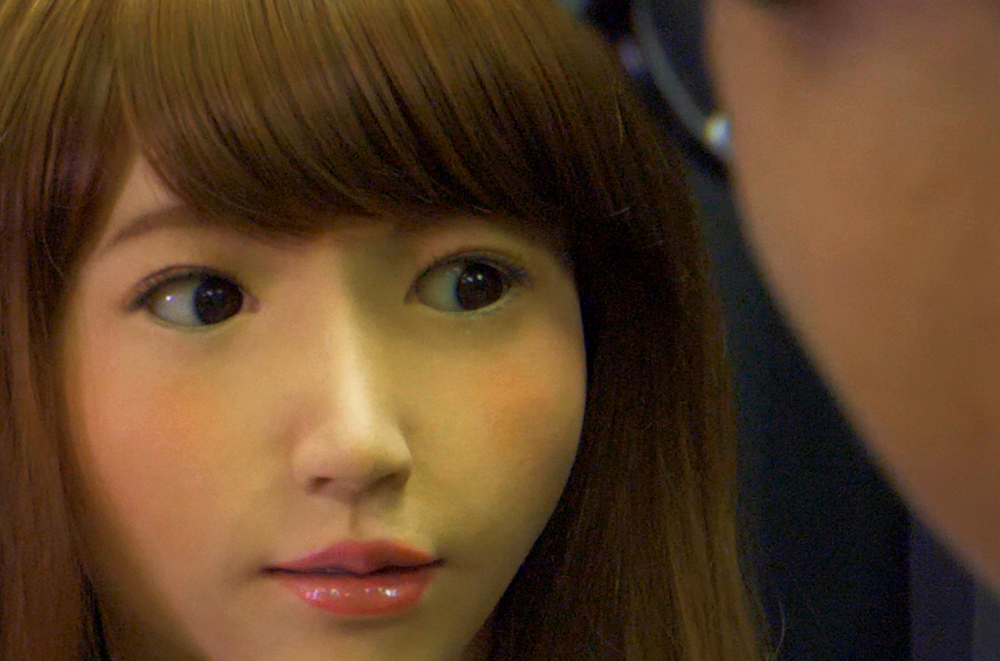Abigail Child is an accomplished filmmaker, writer and poet, who has been active since the 1970s. Her latest effort is the experimental documentary “Origin of the Species,” which is the final part of a trilogy of films on female desire. Within it, she also explores the bond between A.I and humans and the ethical implications that arise due to the advancement of this android technology. Child herself says that “My work concerns itself with the body on the margins, through the lens of experimental form.”
Perhaps it was my own unfamiliarity with the director that led me to be wary of what exactly I was watching as the film commenced. I wondered whether this was really the ‘experimental documentary’ it was claiming to be or something much more. Was there a pseudo narrative I was missing, or was it satire? But alas no. We are thrown into an unnerving montage of robotic androids sounds. The film follows no real narrative with the only direction we are given coming from androids themselves, including BINA48—a humanoid modeled after an African American lesbian woman named Bina Rothblatt, partner of Martine Rothblatt, the openly transgender founder of Terasem Movement Foundation, the non-profit American organization at the forefront of some of the developments in A.I.
Whilst an inspired choice, it is also unsettling and grating as we travel through a whistle-stop tour of scientist’s use of robots to understand humanity without any real direction. The film certainly has plenty to say, but is extremely disjointed, moving from a variety of different topics. We begin in Japan, as Hiroshi Ishiguro from The University of Osaka discusses how he and other scientists project their own ideas and looks (literally) into their creations. He offers viewers a look into the life-like androids and it is here where the film is most exciting as we consider the emerging technology’s ethical and emotional implications. However, the documentary jumps from laboratory to laboratory, offering no real insight on any of the cutting edge technology, how it is being used, or how advanced these scientists actually are. We are instead given a range of philosophical jargon.

When people ruminate on A.I and its advancing technology, they tend to arrive at the subject from a place of fear. This was seen in the worldwide reaction to Sophia, the social humanoid robot developed by Hong Kong-based company Hanson Robotics, who went viral in 2016. She is featured throughout along with other leading A.Is. Child does not explore robotics with fear but rather you can see she is curious and genuinely interested. When the film does find its footing, it’s almost reminiscent of the works of influential documentary filmmaker Chris Marker.
At points it substantiates the pathos of human existence with reflections of memory and expressions of sorrow. If it focused less on being experimental and more on the compelling nature of human and robotic intimacy, perhaps it would have been more thrilling. What did keep me from losing all interest were the pop culture and emotive montages, which were cut to perfection. They were helped by the score which had a Thom Yorke sentimentality, filtering in an undercurrent of dread throughout the film.
In an interview with Women and Hollywood, Child stated that she wanted her audience to question their own relation to machines and what the future may bring. I think she does this best when exploring the implications of ethics and gender. It certainly is an interesting outlook to have a female perspective. The questions of eroticism that she wants to bring into the human consciousness are definitely worth exploring and would have been a great focus throughout. However, the 73-minute film ends up feeling like a drag as there is no real focus or respite from this barrage of information. “Origin of the Species” feels like a wasted opportunity, and lacks any real stimulating execution of what are otherwise compelling motives.